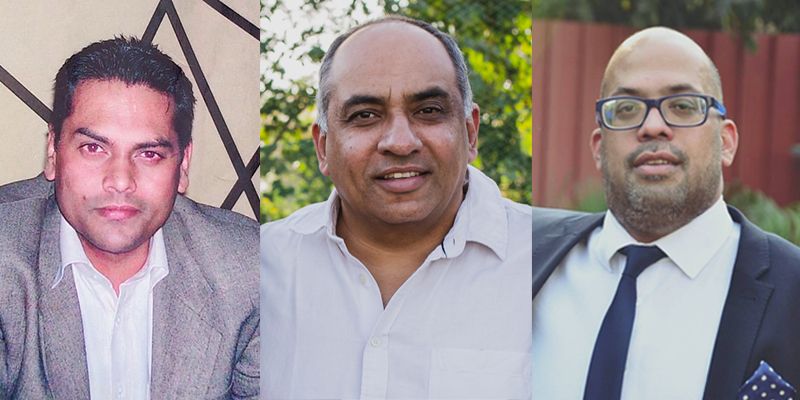Here’s why an ex-Army colonel and two MBAs joined hands to launch India’s first polo startup
Launched in January 2019, Gurugram-based Royal India Polo Club is an invite-only members club. The bootstrapped startup, which is tapping rising interest in luxury sports, is eyeing Rs 4 crore in revenue this year and aims to start in New York next.
Often called the “sport of kings”, polo is one of the world’s oldest team sports. Its origins can be traced to Persia (Iran) between 6th Century BC and the 1st Century AD, but very few may know that the modern version of the game has its roots in India.
And now, nearly 160 years later, three Indians – a former Indian Army colonel and two MBAs from Symbiosis - are looking to revive and promote the sport through what they say is “India’s first polo startup”, the Royal India Polo Club (RIPC).
Launched in January 2019 by Colonel Tarun Sirohi, Vikrant Singh Mathur, and Krishan Ramawat, Gurugram-based RIPC is an invite-only members club.
Col Sirohi was the commandant of 61st Cavalry, the only horse-mounted regiment of the Indian Army, as well as the captain of the Indian polo team. He also served as the secretary of the Indian Polo Association (IPA). Vikrant comes from a sports management background, having worked closely with polo players, team patrons, and sponsors for over a decade. Krishan has a corporate background with two decades of experience in senior leadership positions.
Krishan was Vikrant’s senior at the Symbiosis Institute of Management Studies (SIMS), and the two have been friends for 20 years. Col. Sirohi and Vikrant have known each for 12 years, having worked together with the Indian polo team on sponsorships, commercials etc.
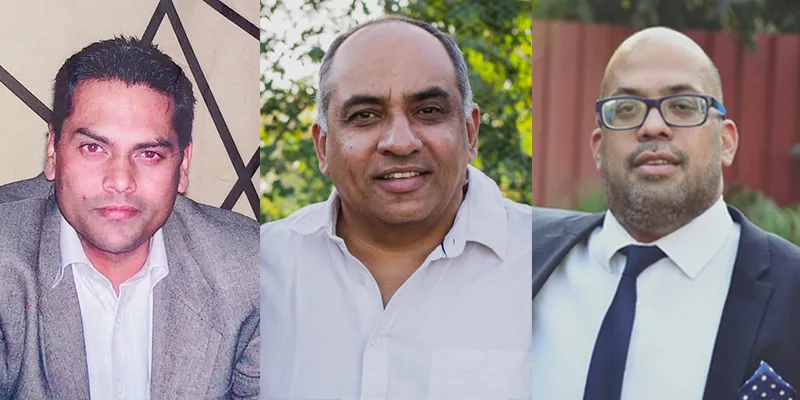
RIPC Co-founders Krishan Ramawat, Col Tarun Sirohi and Vikrant Singh Mathur (L-R)
But why did they come together to revive polo in this digital age?
“We realised sports in India is growing, with a newer generation of players coming in and that there is an increasing interest in luxury sports. For any sport to grow you need infrastructure. We thought of creating world-class infrastructure for polo with our startup,” Vikrant says.
India and polo go back a long way. British military officers took the game from Manipur to Britain in the 1860s, and then through its various colonies spread the sport around the world in the late 19th and early 20th century. In fact, the first polo club in the world was established in Silchar, Assam, by a few British officers in 1859.
The game is played on horseback between two teams comprising four players each. The players use mallets with long handles to drive the ball into the other team’s goal post to score.
RIPC offers players all that they need to play the game – it has its own polo ground, horses, and stables in Gurugram. It is not affordability but accessibility that is stunting the growth of the game, says Col Sirohi, and hence we thought of creating RIPC.
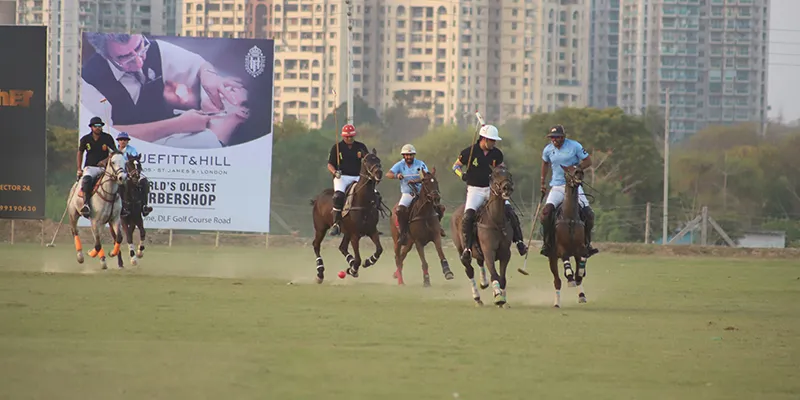
A polo match at RIPC
“For polo, the main kit is the horse. Our members can get access to our stables beside the club’s horses. The club’s 14 horses are primarily for people who want to learn the sport. We first teach them how to ride and then how to play polo. Besides being a polo club, we are also an enabler for people to start playing the sport more,” Vikrant says.
From young school kids to professionals, all club members are trained by polo players from the 61st Cavalry, with Col Sirohi overseeing the sports function of the business, the RIPC founders say. They currently have 50 members on board.
Who can become a member?
RIPC is very particular about who they bring in as a member. Speaking about the things they look for, Vikrant says, “You have to be well educated with a certain amount of pedigree and lineage. Alternatively, you should be from a good business school or an Ivy League institution.”
Every winter, the club organises classic polo sundowners, luxury evenings with free-flowing champagne, single malt, cigars, jazz, and blues.
“There is a sacrosanct environment to these evenings and we would not want any miscommunication there by bringing in members who may not fit that profile,” Vikrant says.

Every winter, RIPC organises classic polo sundowners
RIPC says it gets around 100 requests for membership every month. Applicants need to fill up a form that is carefully assessed. This is followed by a personal chat with the RIPC founders before final on-boarding happens. The annual membership is Rs 1.25 lakh.
However, Vikrant points out that anyone who wants to become a player ideally needs to buy horses. The cost ranges anywhere from Rs 50 lakh to around Rs 2 crore for a string of horses, which is what people typically buy. The reason why a player needs to have at least four horses is because a game of polo is divided into four quarters, each lasting 7 minutes 30 seconds each (called chukka), and a fresh horse is used for each play. The maintenance of each of these horses costs Rs 25,000 a month, including the salaries of the groomer, veterinary doctor etc.
However, not everybody buys horses. “Members can learn riding, polo, and if they don’t want to spend money on buying horses, they can use the club-owned ones. For those who want to buy, we facilitate the purchase,” Vikrant says.
Team ownerships and associations
Members can also have a “family-owned team”. Mahindra Alturas, a luxury SUV offering from the homegrown carmaker’s stable, for instance, has recently signed up with RIPC to create its own polo team. Since the sport is followed mostly by the elite, brands often associate with it as part of their marketing and branding exercise, especially for luxury offerings.
The associations and team ownerships are, however, not just restricted to luxury brands.
Gurugram-based FinEdge, a financial advisory startup, has also launched a team with RIPC. “It is not just a great marketing and branding exercise for corporates; it is also a great networking platform to meet investors and sponsors,” Vikrant says.
Well-known independent automotive writer and analyst Ranojoy Mukerji has launched a team with RIPC in his step-daughter’s name, Reshma Polo.
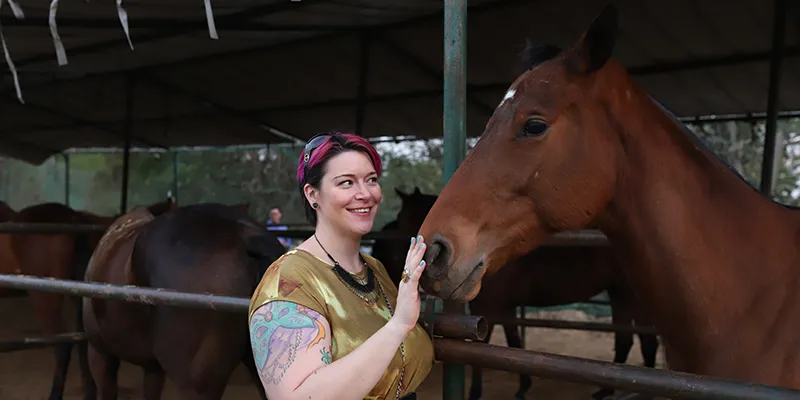
RIPC has its own polo ground, horses, and stables in Gurugram.
Backing the right horse
The company is currently in talks with several companies such as Ducati, Harley Davidson, US Polo Assoc. and GoHype for brand partnerships.
RIPC’s revenue is generated through sponsorships for polo matches from brands, and through memberships and team ownerships. “As a brand we are also extending to merchandise, hospitality, and apparel,” Krishnan says.
He expects RIPC to clock in Rs 4 crore in revenue by the end of the year and turn profitable by next winter. The startup is bootstrapped with the co-founders’ personal savings of a “few crores.” The company is now in talks to raise its first round of angel investment, of around Rs 2 crore, in the next two months “through CEOs and CXOs who are looking to associate with the sport”.
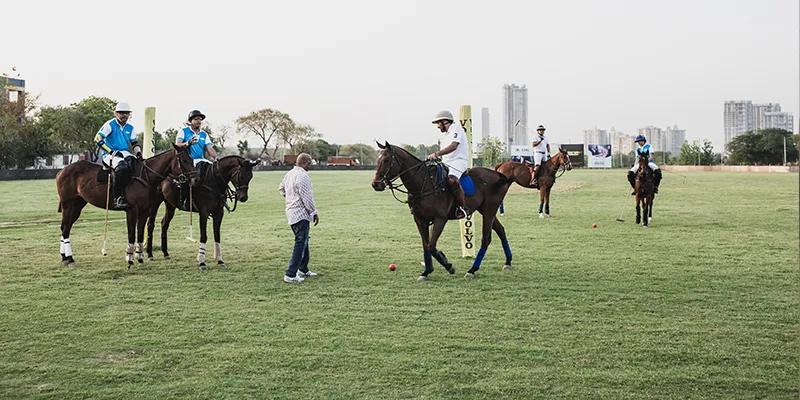
The RIPC polo ground in Gurugram
From Gurugram to New York
After Gurugram, RIPC has plans to set up its next base in New York, and has already identified land there. “We have zeroed in on a huge piece of land in upstate New York, and will mobilise the plan in the next 12-18 months,” Vikrant says.
The format in New York will be identical to the one in India, and the company is looking to partner with “wealthy Indian-origin New Yorkers, bankers, and a fund that has shown interest”.
Next up, RIPC has its eyes set on London and has already had some early conversations to set up a base outside of the metropolis in about two years.
Back home, it plans to open three more centres in Ludhiana, Bengaluru, and Ranchi by the end of the year.
Speaking on the competition, Vikrant says “there really isn’t any”, despite Hyderabad also having a public polo club called the Hyderabad Polo & Riding Club. He reasons: “Delhi and Jaipur are the hubs of polo, and we are at the heart of the sport in terms of location. Hyderabad barely has a week of polo in a year, whereas out here there is a lot of polo that happens between September and March.”
The startup is launching a mobile app within a month that can be used for things such as membership application, booking a ride, booking a seat at a match etc. “Even in England, the sport is not tech-enabled,” Vikrant says. Clearly, RIPC isn’t just horsing around!
(Edited by Teja Lele Desai)






